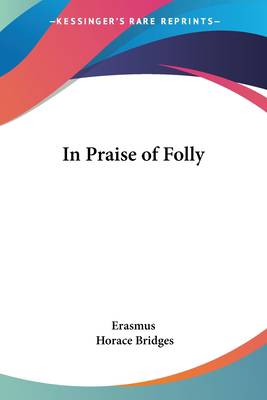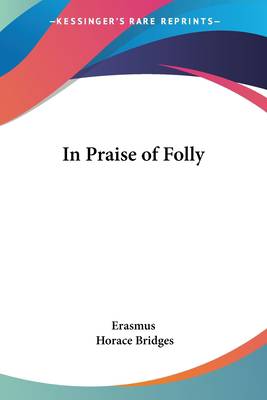
- Retrait gratuit dans votre magasin Club
- 7.000.000 titres dans notre catalogue
- Payer en toute sécurité
- Toujours un magasin près de chez vous
- Retrait gratuit dans votre magasin Club
- 7.000.000 titres dans notre catalogue
- Payer en toute sécurité
- Toujours un magasin près de chez vous
Description
In Praise of Folly is a satirical essay written by the Dutch philosopher and theologian, Desiderius Erasmus, in 1509. The book is a witty and humorous critique of the societal norms and practices of the time, particularly those of the Catholic Church. Erasmus personifies Folly as a character who praises herself and her virtues, while also mocking the follies of human beings.Throughout the essay, Folly praises the virtues of ignorance, foolishness, and self-deception, arguing that they are essential for human happiness. She also criticizes the hypocrisy and corruption of the Church and its leaders, highlighting their greed, lust, and pride. Erasmus uses Folly's voice to expose the absurdity of human behavior, and to challenge the prevailing beliefs and values of his time.In Praise of Folly is a significant work of Renaissance literature and a masterpiece of humanist thought. It is a timeless critique of the human condition and a reflection on the nature of wisdom and folly. The book has influenced generations of thinkers and writers and remains a classic of European literature.1925. Also the pictures of Holbein etched in the author's time, to which are added Mr. Angarola's conception of the period and drawings by way of contemporary comment by Gene Markey. The Praise of Folly is the best known work of the greatest of the renaissance humanists, Erasmus of Rotterdam. Originally meant for private circulation, it scourges the abuses and follies of the various classes of society, especially of the Church. It is a deliberate attempt to discredit the Church and its satire and stinging comment on ecclesiastical conditions are not intended as a healing medicine but a deadly blow. It ends with a straightforward and touching statement of the Christian ideals which Erasmus shared notably with his English friends, John Colet and Thomas More. See other titles by this author available from Kessinger Publishing.This scarce antiquarian book is a facsimile reprint of the old original and may contain some imperfections such as library marks and notations. Because we believe this work is culturally important, we have made it available as part of our commitment for protecting, preserving, and promoting the world's literature in affordable, high quality, modern editions, that are true to their original work.
Spécifications
Parties prenantes
- Auteur(s) :
- Editeur:
Contenu
- Nombre de pages :
- 264
- Langue:
- Anglais
Caractéristiques
- EAN:
- 9781417908998
- Date de parution :
- 16-04-04
- Format:
- Livre broché
- Format numérique:
- Trade paperback (VS)
- Dimensions :
- 155 mm x 229 mm
- Poids :
- 408 g







